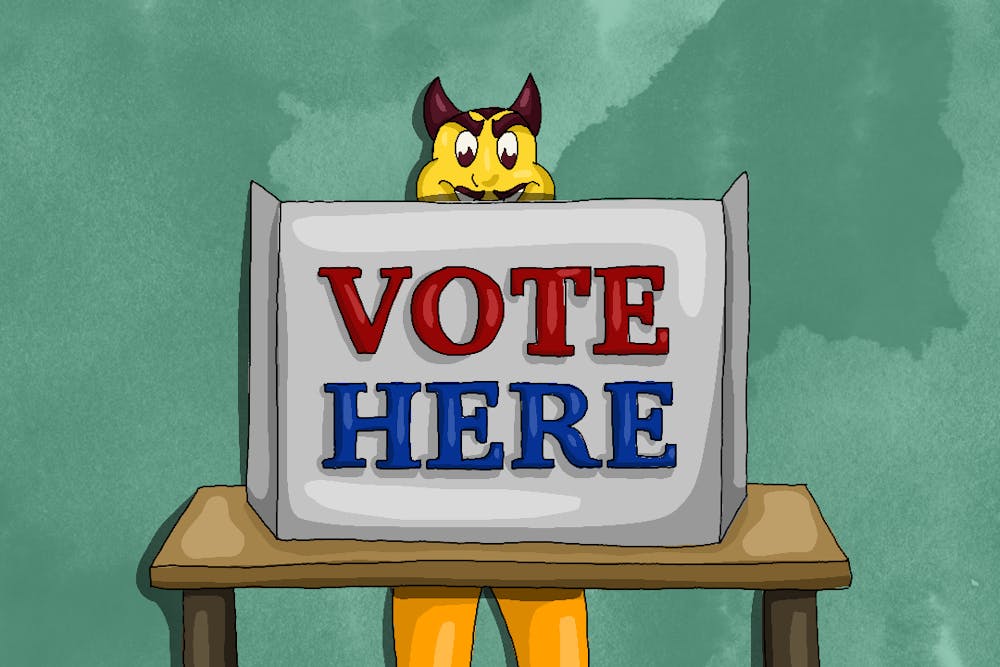Gen-Z, seemingly the most politically engaged generation based on social media alone, may have a voter turnout problem as the consequential November election looms.
Legislative district chairs, political strategists and data gurus are looking at the numbers and have differing opinions on what the 2024 election will look like. Still, they agree that current voter turnout for college students is not ideal.
Voter registration statistics vary depending on whether inactive voters are included and what month of the year the statistics are taken from. But Paul Bentz, senior vice president for research and strategy at Highground Inc., said the Sun Devil precinct registration is about 40% Democrat, 37% independent or unaffiliated and 23% Republican.
The Sun Devil Precinct is bound by the Loop 202 Highway on the north side, University Drive on the south side, Hayden Road on the east side and Mill Avenue on the west side.
Voter participation in the area paints a different picture, according to Bentz. He said nearly half of those who appear for elections are Democrats, whereas about 28% are independent or unaffiliated and about 26% are Republican.
Bentz said, "Tempe is one of the most progressive-leaning cities in Maricopa County." He attributes Tempe's tendency to vote blue to the presence of ASU's main campus in the city.
According to Bentz, college towns regularly lean more Democratic than the cities around them, especially if the states are usually on the conservative side.
"Compare Austin to the rest of the surrounding area of Texas, for example," Bentz said. "Texas is very conservative-leaning, and Austin is very much more progressive."
This trend doesn’t just pertain to the number of Tempe's registered voters. It also extends to how people vote in elections and who turns out on election day.
READ MORE: Deborah Nardozzi appointed new representative for Legislative District 8
Although Tempe has a high number of registered Democrats, the number of residents registered to vote in general is low, and the number of voters that actually participate in elections is even lower.
According to Bentz, college-age people vote primarily in presidential elections but leave midterm or off-cycle elections to voters who are 50 years and older.
"In Arizona, turnout is in the 70-plus percent range," Bentz said. "In 2020, it was 79.9%, which was the second highest in state history. But in the midterm election, for example, it can be in the high 50% range."
According to Bentz, this 20 percentage point difference can be attributed to many factors, such as young people not paying attention to politics, being busy, or not growing up in a family that votes.
A lack of eagerness to vote for two candidates above the age of 75 may keep voter turnout low this election cycle — a fact also pointed out by Bentz.
"You've got two septuagenarians running against one another," Bentz said. "It doesn't create a lot of enthusiasm among younger voters to pick what they would generally perceive as the lesser of two evils."
Although President Biden is currently 81 and now an octogenarian, young voters are still unexcited to vote for any candidate who seems out of touch from their generation.
While Steven Jackson, the chair for LD 8 Democrats, agrees that voter turnout for young people is not as high as he would like it to be, he said certain issues will mobilize the group of voters.
Jackson said he believes there are many reasons for college students to exercise their voting abilities in the next presidential election.
"Specifically in Arizona, where we're probably going to have abortion on the ballot, there'll be a very high turnout for people, specifically younger voters in the state," Jackson said. "It's not just women who we will see that with. I think we'll see that with men as well."
According to Jackson, healthcare, climate change and weapon restrictions are other issues that many young people will vote on. He cites that, for many college students, the 2024 election is the first time they will get the chance to vote.
"There are just so many policies that have gone on in the past three or four years that kids never even thought they'd have to deal with," Jackson said. "Now those kids are almost adults or (are) adults, and they're starting to become voters who are not going to be very happy with some of the things that people are proposing."
READ MORE: David Axelrod series hosts Chris Christie, discusses 2024 election
Carson Hunter, a junior studying business and the vice president of ASU's Politics and Leadership club, agrees that it is as important for young people to be involved in local elections as it is to be involved in the presidential election.
"These local changes are what directly impact the roads they drive, the construction they see and hear, the prices they pay and the people around them," Hunter said in an email.
Hunter said he believes college students have unique perspectives when it comes to politics that result from "growing up in a specific time and environment," where a person's belief systems are critical.
"Unfortunately, that special view of the world and its politics isn't heard enough as our generation is statistically the least involved in politics," Hunter said. "This is extremely dangerous because we have the most to gain or lose in elections, as we will, generally speaking, have to live with the consequences of local political elections for longer than older generations."
Edited by Grey Gartin, Walker Smith and Caera Learmonth.
Reach the reporter at njarret1@asu.edu and @nataliajarrett on X.
Like The State Press on Facebook and follow @statepress on X.
Natalia is a sophomore studying journalism and mass communication. This is her third semester with The State Press. She has also worked as a politics reporter.




